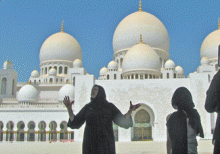 Photo: Dave Cobb (Flickr)
Photo: Dave Cobb (Flickr)
Religious communities around the world exercise extraordinary influence on every aspect of life, including government, education, health care, business, and culture. These groups include virulent anti-American extremists as well as devout ‘militants for peace and justice.’ In the middle are millions of believers who would welcome an open palm from the United States rather than a clenched fist.
Posts in the May 2010 issue of Peace Policy:
Atalia Omer says the United States must not ignore alternative Jewish voices that are both critical of Israel’s policies and committed to Jewish identity and Israel’s right to exist. Read »
R. Scott Appleby argues that it’s in the United States’ best interest to understand global religion and integrate these insights into foreign policy planning. Read »
Emad El-Din Shahin urges the United States to engage with moderate Islamic movements in a relationship based on mutual respect and shared interests. Read »
About Peace Policy
Peace Policy is a blog that offers research-based insights, commentary, and solutions to the global challenge of violent conflict. Each issue features the writing of scholars and practitioners who investigate the causes of violent conflict and who seek to contribute to effective solutions and alternatives to the use of force.
Peace Policy is edited by David Cortright, director of policy studies at the Kroc Institute, dcortrig@nd.edu.
Visit the latest issue of Peace Policy at peacepolicy.nd.edu